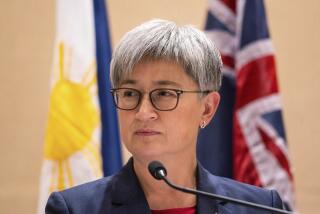Dutch Hostage Freed in Caucasus
- Share via
MOSCOW — A Dutch aid worker kidnapped near the war-torn republic of Chechnya nearly two years ago was freed early Sunday, ending an ordeal that had triggered sharp international criticism of Russian authorities accused of complicity in his captivity.
Arjan Erkel, 34, who headed the North Caucasus mission of Doctors Without Borders, was released before dawn in Dagestan, a Russian republic neighboring Chechnya. He was flown back to Moscow in the afternoon.
Erkel spoke only briefly with reporters and did little to clear up the mystery surrounding his 20 months as a prisoner and his safe release. Looking thin and with a full beard, but in apparently satisfactory health, he said he felt “fantastic” and declared: “If I were in Rotterdam, I would kiss the ground.” He expected to fly home Sunday night, he said.
Erkel was abducted by three gunmen in Makhachkala, the capital of Dagestan, on Aug. 12, 2002. Almost from the time of the kidnapping, Doctors Without Borders insisted that Russian officials had considerable knowledge about the case and were failing to do everything possible to free him.
The aid group said that Russian authorities had acknowledged that two security agents witnessed the kidnapping. Critics of Moscow’s response said that if Russian security officers had not organized the abduction, they had somehow allowed it to take place or were refraining from taking action to free Erkel.
Doctors Without Borders suspended its activities in the region after Erkel was kidnapped. His abduction followed that of another employee of the organization, Kenneth Gluck, an American who was held by unidentified gunmen in Chechnya for about 25 days after he was seized in January 2001.
Some activists thought Moscow was just as glad to see aid workers frightened away from Chechnya because they often criticized the Russian military for alleged human rights abuses in its battle against separatist Chechen rebels.
Few details of Erkel’s detention or release were made public Sunday, and those that were available seemed unlikely to put to rest questions about the possible role of Russian agents in Erkel’s abduction.
Valentin Velichko, a representative of the Russian Foreign Intelligence Service’s veterans organization, told reporters in Moscow on Sunday that his group helped obtain Erkel’s freedom. Authorities said that national as well as regional security and paramilitary forces had won Erkel’s release in a joint operation, but offered no specifics.
“He was brought blindfolded from a place within a 60-minute journey from where we picked him up,” Velichko said. No ransom was paid for the release, which was made to Russian special services, Velichko said in comments quoted by the Russian news agency Interfax.
Erkel was held in several different locations while in captivity, Velichko said. He said he believed that Erkel’s abductors had hoped for ransom money and had sought political benefits.
Erkel’s family was elated by the release. “It’s an amazing feeling of relief. It lasted 607 days,” Erkel’s father told Dutch national television.
“As far as we know, he is in relatively good health. It’s a fantastic liberation for us and for our boy.”
More to Read
Sign up for Essential California
The most important California stories and recommendations in your inbox every morning.
You may occasionally receive promotional content from the Los Angeles Times.













